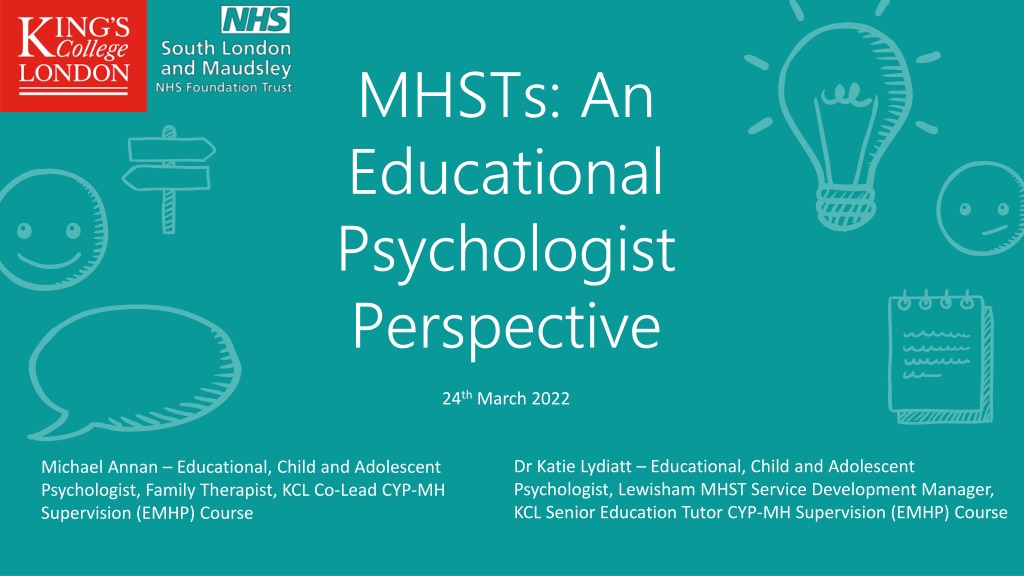Understanding the Role of Educational Psychologists in Mental Health Support Teams
Educational Psychologists (EPs) play a vital role in supporting children and young people, families, and schools by addressing concerns that impact learning and mental health. They work collaboratively with Mental Health Support Teams (MHSTs) to provide systemic interventions and contribute to the overall well-being of individuals in educational settings. This involves contracting, partnership working, assessment, evidence-based interventions, and promoting interdisciplinary collaboration. EPs face challenges like recruitment and sustainable employment options in MHSTs, while also exploring opportunities for systemic thinking and whole school approaches.
- Educational Psychologists
- Mental Health Support Teams
- Systemic Interventions
- Partnership Working
- Interdisciplinary Collaboration
Download Presentation

Please find below an Image/Link to download the presentation.
The content on the website is provided AS IS for your information and personal use only. It may not be sold, licensed, or shared on other websites without obtaining consent from the author. Download presentation by click this link. If you encounter any issues during the download, it is possible that the publisher has removed the file from their server.
E N D
Presentation Transcript
MHSTs: An Educational Psychologist Perspective 24th March 2022 Dr Katie Lydiatt Educational, Child and Adolescent Psychologist, Lewisham MHST Service Development Manager, KCL Senior Education Tutor CYP-MH Supervision (EMHP) Course Michael Annan Educational, Child and Adolescent Psychologist, Family Therapist, KCL Co-Lead CYP-MH Supervision (EMHP) Course
Hopes for the session . Explain the role of an educational psychologist Explore and celebrate the contribution of EPs in MHSTs (and the learning for EPs!) Consider opportunities and challenges
What is an educational psychologist? Educational psychologists work in partnership with CYP, families, schools and increasingly communities where there is a concern that could impact on access to learning in the widest sense. We work at the systemic level, including whole school change projects, through to working with individual CYP who may be experiencing difficulties in a broad range of areas, including social and emotional mental health. EPs may work with MHSTs in a variety of ways, as part of the team or the wider Wellbeing Team with the School.
Context Emotional Wellbeing 1 S C H O O L F A M I L Y 2 3 Community Mental Health Local Authority 4
How might we work? Contracting: Establishing roles and expectations Guiding Hypotheses & information Gathering Evaluate, reflect & monitor An Integrated Framework to Guide EP Practice; Woolfson et al (2003) Joint action plan & implementation Joint Problem Analysis
School readiness Contracting and partnership working Areas of EP contribution to the MHST Assessment and evidence- based intervention Pathways and processes Whole School Approaches 6
Opportunities and challenges Interdisciplinary working Links to EP services Promoting opportunities for systemic thinking in all aspects of the MHSTs work Strengthening the MHSTs work on supporting the whole school approach, including through defining the scope of this work, identifying and developing measures and consolidating its place in national reporting. Recruitment and/or sustainable employment options for EPs in MHSTs
Interdisciplinary team alongside the School School Nurse DSL DMHL MHST: EMHP/Band 6/Supervisor CAMHS Outreach Meet at least termly to consider work at 3 levels: - Universal - Targeted - Specialist Specialist Teacher SALT SENDCO SIP EP School Counsellor Behaviour Consultant EWO SW 8























